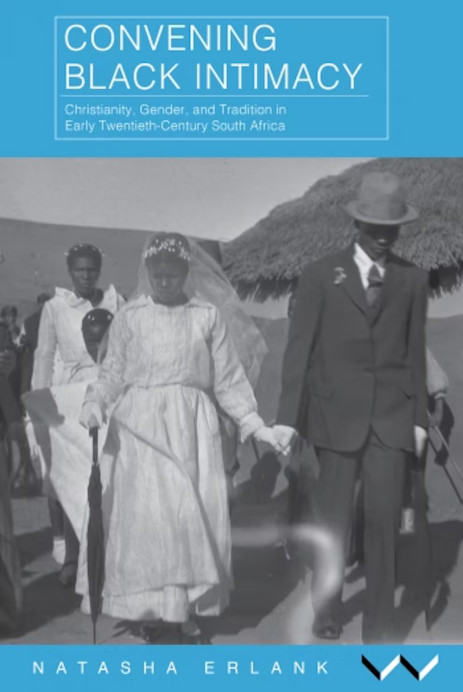Sex, intimacy and black middle-class Christianity in South Africa – a history
Drawing on court records of cases of seduction and church texts, a historian has written a book exploring precolonial marriage and sex in the late 1800s and early 1900s.
Wedding vows, marriage, matrimony. Picture: Pixabay
This article first appeared on The Conversation
By Natasha Erlank
A new book, Convening Black Intimacy, explores the history of Christianity, gender and precolonial marriage and sex traditions in South Africa in the late 1800s and early 1900s. To conduct her study, historian Natasha Erlank drew on court records of cases of seduction, church records, anthropological texts, and many sources from black authors, including black newspapers and novels as well as songs sung by black women. What is clear is that black South Africans had loving, intimate relationships that they fought hard to maintain under the destruction brought about by colonialism and apartheid. We asked her more about her fascinating book.

How were views of intimacy shaped before colonialism?
Before colonialism in the 1700s, black South Africans viewed sex and its relationship to morality very differently than it’s viewed today. Views of intimacy were largely shaped by the expectations of the extended family. When a young man married, his family transferred ilobolo (bridewealth) to a young woman’s family as an acknowledgement of the joining of families. Ilobolo cemented families together and introduced a bride not only into her husband’s extended family or lineage, but also to his family’s ancestors.
Sexual or intimate relationships were governed by the importance of strengthening this lineage.
Historical sources tell us that even unmarried young men and women regularly engaged in a range of sex acts. Ukumetsha or ukusoma (the isiXhosa and isiZulu language words for thigh sex) were regarded as a good way for young people to have healthy sexual relationships without falling pregnant. Sexual behaviour like this was socially acceptable. Potential moral wrongdoing lay in a pregnancy not recognised by the ancestors, not in the sex itself. Even married women and men might have affairs, as long as they were discreet, because any child born of an affair still belonged to the husband’s lineage.
What changed with colonialism?
Under colonialism, Africans found their intimate practices considerably changed. Colonial rule introduced laws and policies that taxed polygamous men more than men who had only one wife. The colonial legal system viewed Africans as immoral because of practices like polygamy and ilobolo.
Africans found it less and less easy to conduct love affairs and marriages in the way they had before. Black intimate relationships became a “problem”, an issue of “black hypersexuality” or immorality, for white South Africans, who seldom considered that black relationships could be loving and supportive.
How did Christianity introduce a new moral code?
Christianity spread rapidly in southern Africa after the start of the 1800s. European mission societies established mission stations beyond the borders of the Cape Colony. The real work of conversion, however, was undertaken by black evangelists who learnt about the gospel from the missionaries, translated it into local languages, and spread it. In some parts of southern Africa, a royal family might convert first, and a kingdom’s subjects then follow their leader. In the Eastern Cape province, women were generally the first in their families to convert – this helps to explain why, today, women make up over 50% of African church membership.
European mission families imported their own ideas about sex and sexuality to South Africa, ideas that viewed premarital sex, polygamy and ilobolo as sinful. Africans who converted found that they had to adopt moral codes, especially around sex, that had no historical precedent in their own societies.
The stage was set for a clash between following a so-called Christian code of behaviour with respect to sex and respecting indigenous practices around marriage and sex.
What is the result of this today?
My research covered the late 1800s and early 1900s. Historical evidence in the form of testimony given in court cases around seduction shows that African women disproportionately shouldered the moral burden of Christianity and its teachings about sex. When young women fell pregnant outside marriage, they bore the brunt of any shame, as church records and letters from the period show. Their male partners largely got off free of consequence. At the same time, men away on labour contracts at South Africa’s urban centres found it difficult to marry with ilobolo, because they earned too little to fund the cattle needed to marry. Or because their fathers in the rural areas were unable to supply the cattle needed.
Both these factors – men separated from family responsibilities and marriages without the support of ilobolo – had negative impacts. The period after 1948, the start of apartheid white minority rule, saw a decline in the rate of African marriages and a rise in the number of female-headed households surviving without male earnings. Paradoxically, Christianity should have supported family life, but it also promoted male authority within the family. Control over wives and female family members, especially their sexuality, was no doubt one way in which black men could compensate for a lack of power and authority outside the family.
The book is available from Wits University Press
For all the latest lifestyle News Click Here

